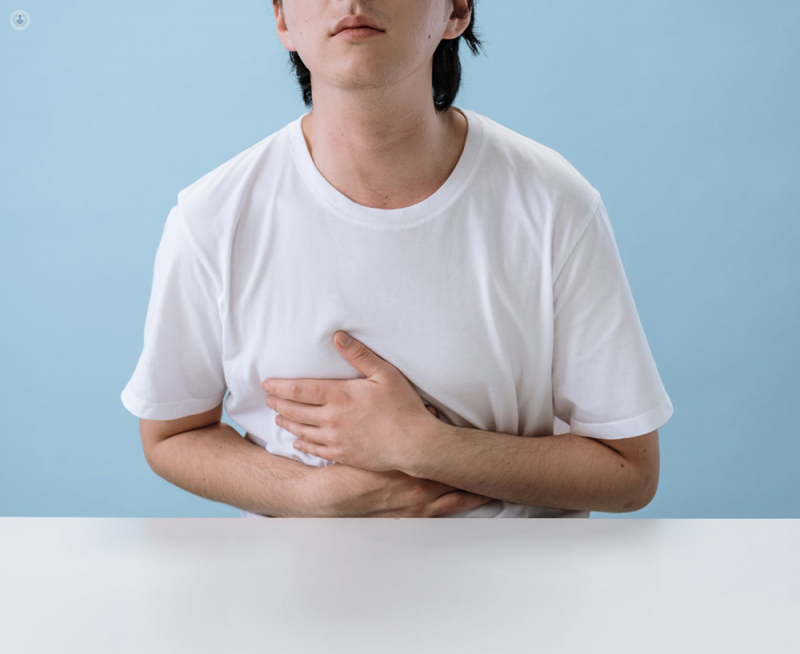What to do about bloating, burping and flatulence
Written in association with:We are all guilty of feeling bloated if we have overindulged in rich foods, or of needing to burp after eating or drinking too fast. But in some people, there might be an underlying reason for such symptoms. In this article, one of our top gastroenterologists Dr Aathavan Loganayagam explains all of the possible causes of bloating, burping and flatulence, and what you can do to prevent them from occuring.

What causes excessive burping?
Burping (or belching) occurs when the stomach or oesophagus fills with air. The escape of air from the stomach after eating with a few burps is normal. However, when ingesting excessive air into the oesophagus, a condition known as aerophagia can happen.
This can happen when we:
- talk and eat at the same time
- eat and drink in a hurry
- chew gum
- drink through a straw
- smoke cigarettes
- other medical conditions
Repeated swallowing of air into the oesophagus and then belching to release it is called habitual aerophagia.
In aerophagia, the patient may also complain of excessive burping, bloating of the abdomen, gas and excess flatulence. Burping may occur many times, up to 20 to 30 times in a few minutes.
What other conditions cause burping?
There are also other conditions that can cause excessive burping. This includes acid reflux or gastro-oesophageal reflux disease (GORD), functional dyspepsia where the patient complains of additional symptoms like pain over the upper abdomen or feeling of fullness after eating a normal-sized meal, slowdown in stomach emptying which is called gastroparesis, as well as mechanical blockage of the intestine.
How can burping be managed?
Management of excessive burping includes avoiding habits like talking and eating at the same time, chewing gum and stopping smoking.
Anyone with excessive burping should see a doctor if there are symptoms suggestive of habitual aerophagia such as weight loss, heartburn or regurgitation, difficulty in swallowing, and if the burping is troublesome and does not respond to lifestyle changes as outlined earlier.
What does bloating feel like?
Bloating refers to a sensation of fullness in the abdomen and flatulence refers to the passage of rectal gas.
Some people who complain of abdominal bloating do not have excess gas compared to others. However, they seem to be more sensitive to even normal amounts of gas compared to others.
Some people have weak abdominal muscles and appear to be bloated especially after pregnancy. They think it is gas, but the distension disappears when they lie flat, so it is due to weak abdominal muscles rather than gas.
What causes bloating?
There are several causes of bloating due to gas and increased flatulence which include swallowing of too much air while eating or drinking, dietary reasons such as a high FODMAP diet or consuming a diet rich in fatty foods, too much fibre in the diet and many other causes that the doctor may discover.
If symptoms of gas and bloating occur less than 30 minutes after eating the problem is usually from the stomach. It can be due to functional dyspepsia or a slow-down in stomach emptying called gastroparesis.
If symptoms of gas and bloating occur 30 minutes after eating, the problem is usually from the small intestine and can be due to FODMAP foods, coeliac disease, small intestine bacterial overgrowth and irritable bowel syndrome (IBS).
How can bloating be managed?
To manage your symptoms, try to avoid swallowing too much air, take a low FODMAP diet, reduce the intake of fatty foods, modify your fibre intake, exercise and consume probiotics for one month. Most importantly, consult a specialist.
Book an appointment with Dr Loganayagam via his Top Doctor’s profile here for his expert medical opinion in your case.


